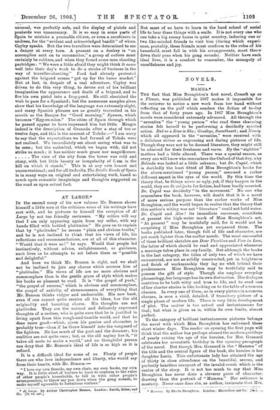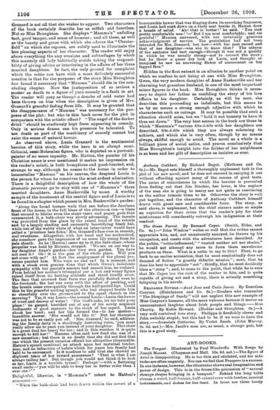NOVELS.
MAMMA,
THE fact that Miss Broughton's first novel, Cometh up as a Flower, was published in 1867 makes it impossible for the reviewer to notice a new work from her hand without reflecting on the gulf which sunders the fiction of to-day from that of forty years ago. In 1867 Miss Broughton's novels were considered extremely advanced. All through the " seventies " the "young person" who read these charming stories felt herself to be performing a decidedly spirited action. Red as a Rose is She; Goodbye, Sweetheart ; and Nancy which all appeared in the "seventies," were received witk a delicious Wye': as engrossing and daring pictures of life. Though they were not to be deemed literature, they might still be admired for their freshness and verve. By the "eighties" matters had a little altered. There was a special reason, as every one will know who remembers the Oxford of that day, why Belinda was looked at a little askance; but Dr. Cupid, which is decidedly the least fitted of Miss Broughton's books for the above-mentioned "young person," assumed a rather different aspect in the eyes of the world. By this time the theory that, be things never so ugly, yet, if they happen in the world, they are fit subjects for fiction, had been loudly asserted. Dr. Cupid was decidedly "in the movement." No one who remembers the book, however, will doubt that it is a novel of more serious purpose than the earlier works of Miss Broughton, and the world began to realise that the theory that this author's witing was not "literature" could not hold water. Dr. Cupid and Alas ! its immediate successor, constitute at present the high-water mark of Miss Broughton's art. "At present" may be truthfully said, for it would not be surprising if Miss Broughton yet surpassed them. The books published later, though full of life and character, are yet much lighter than the earlier novels. The most successful of these brilliant sketches are Dear Faustina and Foes in Law, the latter of which should be read and appreciated whenever a marriage takes place in any family. But although the books in the last category, the titles of only two of which we have enumerated, are not so solidly constructed, yet in brightness and finish of workmanship they lag no whit behind their predecessors. Miss Broughton may be truthfully said to possess the gift of style. Though she employe everyday phraseology, her language has its own distinction. Her dialogue contrives to be both witty and true to life, and to read one of her shorter stories is like looking on to the table of a camera obscure. In every one of them, as in every picture in a camera obicura, is seen a vivid, detailed, if transitory picture of a single phase of modern life. There is very little development of Iplot. The matter is too actual and instantaneous for that; but what is given us is, within its own limits, almost perfect.
To the category of brilliant instantaneous pictures belongs the novel with which Miss Broughton has enlivened these short winter days. The reader on opening the first page will think that the author has perhaps abused the modern privilege of yearly raising the age of the heroine, for Mrs. Granard celebrates her seventieth birthday in the opening paragraph of the novel. But though Mrs. Granard is the " Mamma " of the title and the central figure of the book, the heroine is her daughter Lucia. This unfortunate lady has attained the age of thirty in close attendance on the beautiful, serene, and perfectly heartless occupant of the invalid-couch which is the centre of the story.. It is not too much to say that Miss Broughton has never done a cleverer piece of character: drawing than the portrait of "Mamma." Her reticence .is masterly. Never once does she, as author, insinuate that Mrs.
• Mamma. By Rhoda Broughton. London: Mcmiflan,d Co.' [41 Granard is no all that she wishes to appear. Two characters of the book certainly describe her as selfish and heartless. Not so Miss Broughton. She displays "Mamma's" unfailing tact, good temper, and sense of humour; and all these, as well ES the beauty and grace with which she adorns the "Chester- field" on which she reposes, are subtly used to illuminate the less pleasing aspects of her character. The reader will enjoy above everything the airy evasions and subterfuges by which this masterly old lady habitually avoids taking the responsi- bility of giving advice or interfering in the affairs of her three married daughters. In fact, the only ground for complaint which the critic can have with a most delicately successful creation is that for the purposes of the story Miss Broughton has found it necessary that "Mamma" should die in the con- cluding chapter. Now the juxtaposition of so serious a Platter as death to a figure of pure comedy is a fault in art. The reader will gasp as though a douche of cold water had been thrown on him when the description is given of Mrs. Granarcl's graceful fading from life. It may be granted that the disappearance of "Mamma" was necessary for the pur- poses of the plot; but who in this book cares for the plot in comparison with the artistic effect P "The angel of the darker drink" should be studiously kept from appearing in comedy. Only in serious drama can his presence be tolerated. To use death as part of the machinery of comedy cannot but raise the sense of natural horror.
As observed above, Lucia Granard is the sentimental heroine of this story, while the hero is an abrupt semi- Colonial, semi-Bohemian figure, who is depicted as a portrait- painter of no mean capacity. Mr. Hatton, the painter (if his Christian name is ever mentioned it makes no impression on the reader's mind), is both bumptious and good-hearted, and, strange to say, although he comes to the house in order to immortalise "Mamma" on his canvas, the despised Lucia is the person for whom be conceives the most ardent admiration. There is a delightful description of bow the whole of the dramatis personae go to stay with one of "Mamma's" three married daughters, Anne Baskerville by name. A worthy sample of the treatment of the central figure and of Lucia is to be found in a chapter which passes in Mrs. Baskerville's garden: "Along the broad terrace walk that ran before the Jacobean front of the house, in the full blaze of the afternoon sun—a blaze that seemed to blister even the stone rases and pagan gods that ornamented it, a bath-chair was slowly advancing. The inmate was protected from the glare by the raised hood of the vehicle and by a largely shading and eminently beautifying black hat, while out of the webby white of what an interviewer would have called a 'priceless lace fichu,' Mrs. Granard's face rose in smooth, pool sweetness. Altogether, with her hood and her neckerchief, he somehow gave the impression of an arum lily rising from its pale sheath. As he [Hatton] came up to it, the bath-chair, whose propeller was held by Mamma, stopped. We are on our way to my daughter Anne's garden—her very own garden. You have not seen it ? Oh ! it is the gem of the whole place. Will you not come with us ?' At first the employment of the plural pro- nouns puzzled him. Who were we and us? In a moment, and with a shock even greater than that which Gwen's indelicate sympathy with her parent's amours had caused him, he realized. From behind her mother's triumphal car a hot and weary figure raised itself from its butting attitude and stood tiredly erect. The face that crowned that form was painfully flushed even to the forehead; the hat was awry with the effort of pushing, and the breath came over-quickly through the half-parted lips. Could this be the graceful smiling nymph who had stepped beside him go cheerfully over the greensward to the squat church in the morning? Yes, it was Lucia—the normal Lucia—Lucia the hewer a wood and drawer of water ! For God's sake, let me take your place ! ' he gasped, horrified out of any of his newly acquired rudiments of good manners by the shock of her aspect. Lucia shook her head; and her lips formed the—to her mother— inaudible answer. 'She would not like it.' But her champion was not to be so easily put off. Mrs. Granard,' he said, address- ing the family deity in a shockingly hectoring voice, 'you must really allow me to push you instead of your daughter. This chair is a great deal too heavy for her ; and in this weather it is quite enough to kill her !' Mamma often said how fond she was of a new sensation; but there is no doubt that she did not find that one which the present occasion offered her altogether pleasurable. Battou's speech cembined an attack upon her maternal tender- ness, and an infraction of habits which for years her family had held to be sacrosanct. Is it needless to add that she showed no slightest trace of her inward annoyance ? That is what I am always telling her! But though you would not think it to look a; her, Lucia is a terrible tyrant! Perhaps '—with a flattering small smile—' you will be able to keep her in better order than I ever can!"
Delightful, likewise, is " Mamma's" retort to Hatton's
comment :—
honeysuckle bower that was flinging down its searching fragrance, and Lucia had sunk down on a turfy seat beside it, Hatton drew a breath of relief. `Ah ! that is better !' he said. You look pretty comfortable now !'—' But I am most comfortable; and to grateful ! ' Mamma answered, with her invariably gracious acknowledgment of service. The gratulation had not been intended for Mrs. Granard, but how—with her past record and that of her daughter—was she to know that ? The utterer of the sentence had tact enough—though it was not a quality in which he was usually strong—not to correct the error ;. but he threw a queer dry look at Lucia, and thought or imagined he saw an answering flicker of amusement on her fagged face."
Hidden in the first extract is an allusion to another point on which we confess to not being at one with Miss Broughton.
Gwen, the very modern daughter of Anne Baskerville and her charming but graceless husband, is one of the most important minor figures in the book. Miss Broughton thinks it neces-
sary to depict her father as confiding the story of his love affairs to his daughter. Certainly, as will be seen, she describes this proceeding as indelicate, but this seems to us by no means a strong enough adjective with which to characterise such an outrage. It may be possible that such a situation should arise, but we "hold it not honesty to have it thus set down." The very best scenes in the book are those in which "Mamma's" various tete-a-tete with her daughters are described, tete-a-tete which they are always scheming to achieve, and which she is very often, though by no means always, skilful enough to avoid. The novel as a whole is a
brilliant piece of social satire, and proves conclusively that Miss Broughton's insight into the foibles of her neighbours is aa keen and her gift of description as incisive as ever.







































 Previous page
Previous page